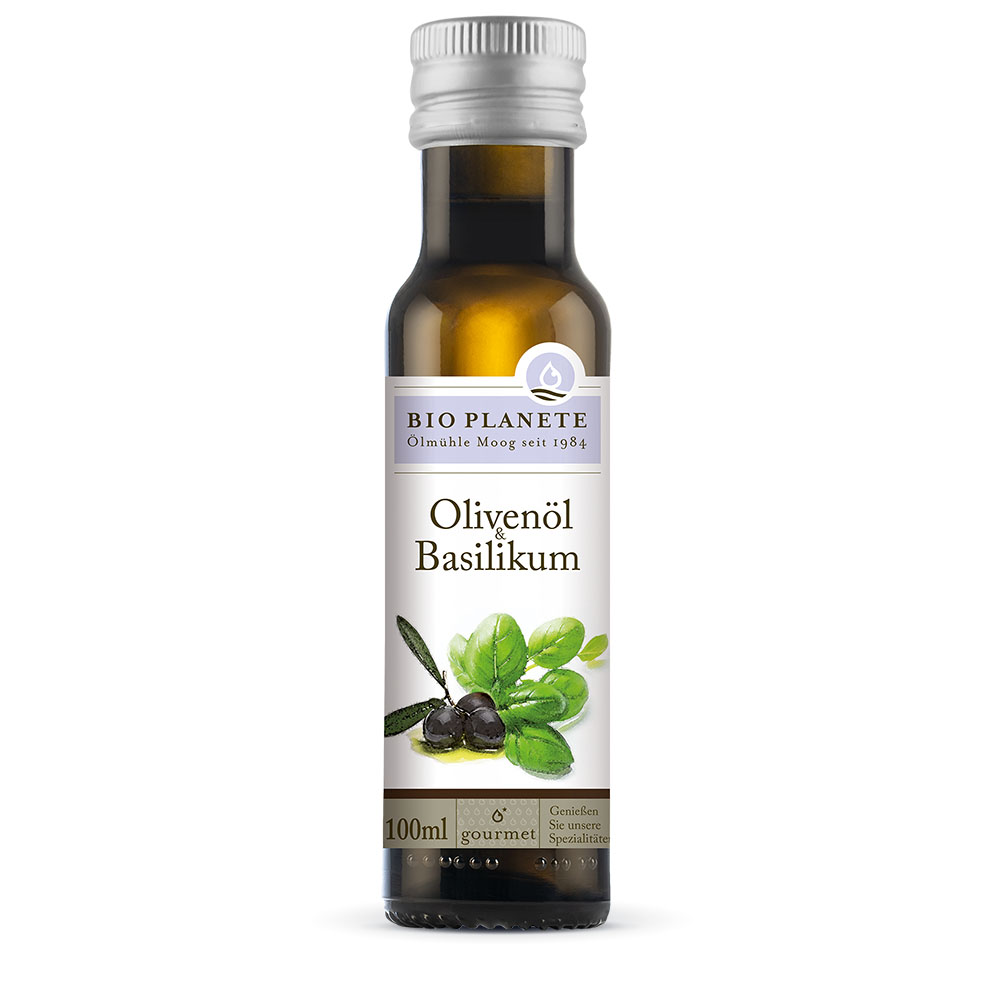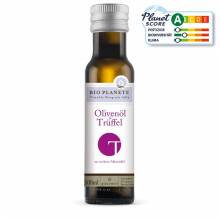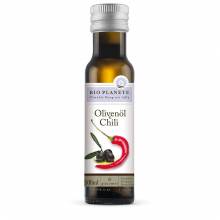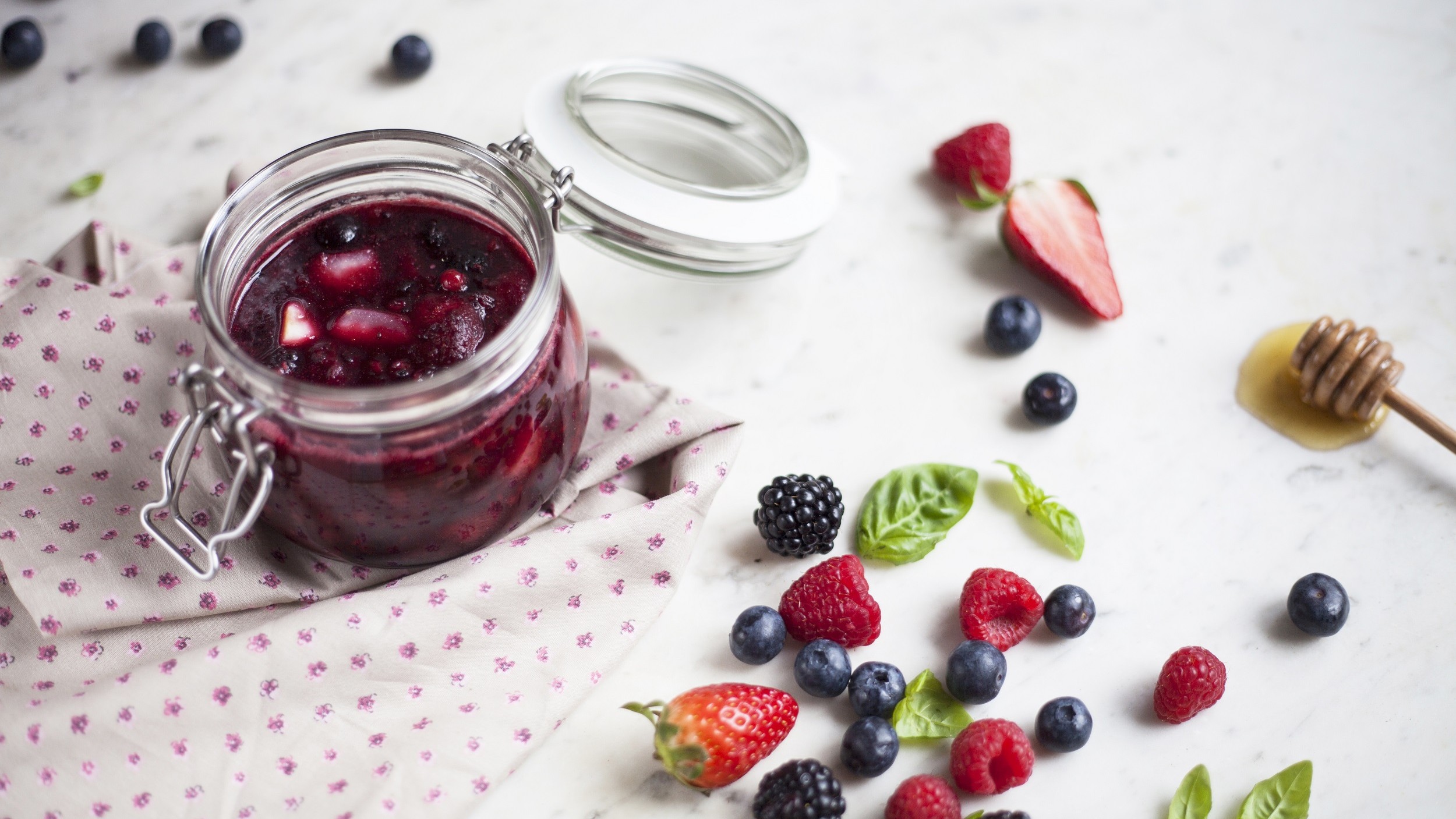Olive Oil & Basil
· Specialties ·
100 ml
For this BIO PLANÈTE condiment Olive Oil, we blend precious basil and fine Olive Oil from Portugal into one aromatic fresh composition. It is so aromatic that there is no need to add any essential oils – 100% natural and 100% organic.
Immediately after their harvest, the ripe olives along with fresh basil are pressed by our partner mills. During this process, the basil’s natural essential oils merge with the Olive Oil and provide it with a unique aroma. We use the olive varieties Cobrancosa, Cordovil de Serpa and Arbequina for our delicious condiment oil.
Ideas for recipes and use of Olive Oil & Basil
Basil is also referred to as “king of herbs”. Its intense aromatic characteristics blend in perfectly with the olive oil’s traits. This way, the Olive Oil gives off a Mediterranean aura in every dish and offers versatile applications: It is perfect for risotto, pizza, and pasta, as well as for improving sauces, salads and deliciousred fruit jelly with basil.
You are also welcome to try out our olive oil specialties: Olive Oil & Truffle, Olive Oil & Garlic and Olive Oil & Chili.
When harvesting our olives, we can rule out the possibility of birds being killed by highend automated harvesting equipment. We are in constant close contact with our farmers, who only harvest olives during the day using gentle vibration machines or by hand. Learn more about olive harvesting techniques here.
* Product of organic farming
Average nutritional analysis for 100 ml
** % of daily reference intake (adults)
-
How long can I keep Olive Oil?
In contrast to wine, Olive Oil does not get better with age. Its essential components, such as mono-unsaturated fatty acids, vitamin E and polyphenols are broken down when stored for a long time. This also creates substances which negatively impact on taste. That's why you should use Olive Oil within a year or at most two years of it being harvested. The use-by dates give you a safe guidance value of good quality and taste.
-
How are olives harvested? Do birds die during olive harvest?
No. Our olives are harvested by hand using gentle rocking techniques. The olives fall on a collecting screen which the farm labourers can remove. We maintain continuous close contact with our farmers and can definitively confirm that, in the absence of highly automated harvesters, no songbirds are killed. Our farmers grow their olives in traditional regions using old, large olive trees on rocky ground which make it impossible to use such harvesters.
-
How should I store Olive Oil?
Olive Oil should always be protected from light irradiation. That's why we always fill our BIO PLANÈTE Olive Oils in high-quality light-protection bottles which shield the oil from light and oxygen. Olive Oil can be stored in the fridge, but this is not a requirement. It also lasts for many months at room temperatures.
-
Can I still use flaky Olive Oil?
Olive Oil can become flaky at temperatures below +7°C. This is normal and does not influence its quality or taste. If you increase ambient temperature again, the oil will liquefy again within only a few hours.
-
Do you supplement the Condiments Olive Oil with additional essences?
No, immediately after the harvest, the fresh olives are pressed together with select basil, garlic or chillis. In this way, the natural, intense aroma passes to the Olive Oil. The olive varieties Cobrancosa, Cordovil de Serpa and Arbequina are used. These harmonise outstandingly with the natural flavours.
-
What is Condiments Olive Oil used for?
Its intense aroma harmonises perfectly with that of Olive Oil. Condiments Olive oilmagicly adds a Mediterranean flair to every dish and can be used in many different ways: it is perfect for risottos, sauces, meat, pizza, bruschetta, salads and pasta as well as to refine sauces and salads.
-
What conditions and standards are behind the organic seal on our oils?
An organic seal is a quality and test seal with which products from organic farming are marked. In 2010, a binding new organic seal was introduced throughout the EU, also known as the EU organic logo, which identifies food from organic farming (a star-shaped leaf on a green background).
This seal replaced the German state organic seal (green hexagon with "BIO" lettering), which had existed since 2001, with the same standards in terms of content. Due to the high degree of popularity of its predecessor, both seals are still often used today.
The use of this certification is strictly regulated by the publisher and is subject to ecological requirements. Compliance with the criteria by producers is ensured by a documentation obligation as well as regular sampling and examination of product samples. Compliance with the regulations is monitored in Europe by the responsible Eco-Control bodies.
Foods labelled with the organic seal must, among other things:
• Not be produced by or with/from genetically modified organisms
• Not to be produced with the use of synthetic pesticides
• Contain no more than 5% conventionally produced components (in exceptional cases, if ingredients are not available in ecological quality, in accordance with Annex VO)
• not contain sweeteners and stabilisers as well as synthetic colourants, preservatives and flavour enhancers
• not result from monotonous crop rotations (two-, three- and four-field farming)
• and much more: more information on the EU Organic Label -
Can I use the oil even after the expiration date?
We can no longer guarantee the oil's perfect quality after its best before date.
In the interest of sustainability, however, we would like to point out the following: vegetable oils do not belong to the group of very sensitive foodstuffs and can usually still be consumed after the best-before date. This is especially true if the bottle is still sealed and it has been stored away from heat sources. Therefore, we recommend using your senses to test the oil before disposing of it. Oil that has been stored for too long can be easily recognized by smell and taste. If it tastes rancid or unusual (off), it should not be consumed. -
How do I remove the labels from the jars and bottles?
Since we use oil-soluble glue for the labels, the best way to remove the label from the coconut jars is with oil. Simply coat the label with oil, let it absorb overnight and peel off easily in the morning. However, if the label is already off and only the glue is on it, this method doesn't work as well. In this context, we have been told of positive experiences with orange oil cleaner, such as from AlmaWin or Sodasan. Another option is a hair dryer - because heat also loosens the label well.
Get more suggestions at Upcycling & Creative.






